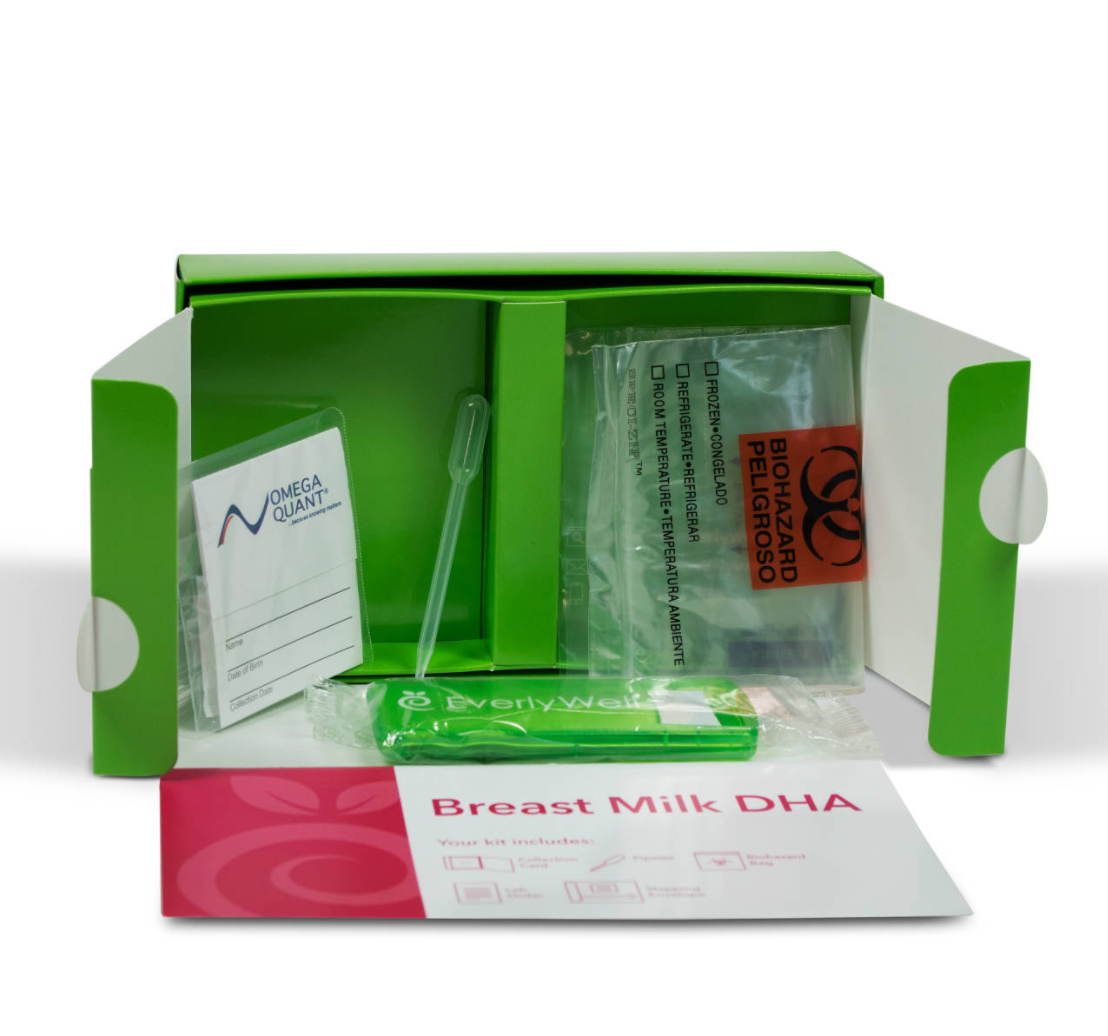 Austin-based EverlyWell has added a new kit to its at-home testing service: now, women who are nursing have the ability to test the DHA levels in their breast milk.
Austin-based EverlyWell has added a new kit to its at-home testing service: now, women who are nursing have the ability to test the DHA levels in their breast milk.
“There is tons of research supporting the benefits of DHA levels in breast milk and how that correlates to the baby’s development and inflammatory responses like respiratory allergies, asthma and exzema, so the more DHA you can provide for the baby, the more they can get out of breast milk,” Dr. Marra Francis, EverlyWell’s Chief Medical Officer, told MobiHealthNews in an interview.
The company, which offers a suite of tests including food allergies, STDs and cholesterol, worked with testing company OmegaQuant to develop the technology, which uses a drop of breast milk dried on a card that can be easily sent through the mail. If a woman’s DHA levels are outside the optimal ranges for breastfeeding, EverlyWell will connect her with evidence-based guidance on any dietary or lifestyle changes that could improve her levels. The test is $69, generally covered by HSA or FSA accounts, but Francis said the biggest value is the accessibility.
“It’s not very easy to get a doctor to order this test, because an insurance company will generally not cover it unless it is a very serious situation. DHA is cardioprotective in adults, so it would have to be someone with a lot of risk factors,” she said. “You are never going to get someone to order it only because you happen to be a breastfeeding mom.”
...
Among IBM Watson Health's many other launches and partnership announcements at HIMSS 17 in Orlando, the company debuted the Imaging Clinical Review, its first cognitive imaging offering. The tool employs AI to review medical data and help medical professionals identify cases needing the most immediate attention. The company also announced its suite of Value-Based Care Management tools, a cloud-based offering which is designed to help providers, health plans and employers to better manage costs and quality of healthcare services. Over time, it will integrate the combined capabilities of Watson Care Manager, Truven Health Analytics, Phytel and Explorys (which were all announced at earlier HIMSS conferences) and patient-level data from a variety of sources.
At the same time, M.D. Anderson reportedly put its partnership with IBM Watson on hold. The collaboration was originally announced in October 2013 and MD Anderson has reportedly already sunk $62 million into the Oncology Expert Advisory project, which used the IBM Watson cognitive computing system to facilitate its fight against cancer. But the project hasn’t met its goal, and MD Anderson has stated it is looking elsewhere in the market for a partner.
...
Salesforce is now integrating Validic’s personal health data connectivity platform with its Customer Relationship Management system and Salesforce HealthCloud. The integration adds a “Health/Wellness” application into the CRM, so Salesforce can securely view Validic-provided data from over 400 personal health devices –such as those that track sleep, weight and biometrics from remote chronic condition monitoring – through displays stored natively in the Salesforce interface, allowing for care teams to manage patient populations in near real-time.
...
Ambra Health, which makes medical data and image management SaaS, launched a cloud development platform for medical imaging during HIMSS 17. The platform provides new APIs for health system and hospital IT departments to extend imaging and data into other applications like population health or reporting tools, and it also allows third-party developers to integrate Ambra technologies to a variety of healthcare applications.
"The Ambra cloud development platform is a natural next step in the evolution of Ambra imaging services," Morris Panner, CEO of Ambra Health, said in a statement. "Imaging doesn't live in a silo and needs to be closely coupled with other applications in the care continuum. Now, providers and other third parties can build from our best-in-class, open system, to create new solutions that provide better, more efficient patient care.”
...
Health information network Surescripts announced the expansion of its National Record Locator Service, with four more major health systems taking it live this week. These last few partnerships signal Surescripts' deployment in all 50 states across 10 major metropolitan areas. The NRLS, which was launched in January, equips providers with quick, easy access to clinical records for 230 million patients and four billion nationwide patient visit locations, which includes hospitals, physician practices and community medical clinics. The service is part of Surescripts’ Carequality framework, and automatically queries Carequality implementer locations to enable electronic data sharing across platforms and networks within existing EHR workflows.
“As consumers of healthcare, patients are demanding a more connected healthcare experience,” Surescripts CEO Tom Skelton said in a statement. “Our goal is to accelerate provider adoption of critical data-sharing technologies to increase patient safety, lower costs and ensure quality care.”
The new customers are Saint Francis Hosptial and Medical Center in Connecticut, Singing River Health System in Mississippi, SLUCare Physician Group in Saint Louis, and WVU Medicine in West Virginia.
“Since deploying Surescripts National Record Locator Service in January, our care teams are already seeing the benefits of having real-time access to valuable clinical information, no matter where a patient previously received treatment,” Dr. C. Steven Wolf, Chairman of Emergency Medicine at Saint Francis Hospital and Medical Center, said in a statement. “We look forward to continuing to harness the benefits of NRLS to ensure that our patients receive top-quality care, in every circumstance.”

















